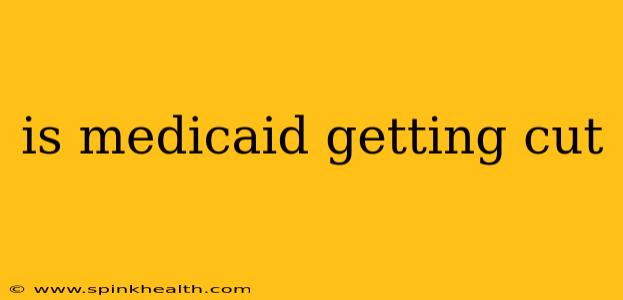Is Medicaid Getting Cut? Navigating the Uncertainties of Healthcare Funding
The question of whether Medicaid is getting cut is a complex one, far from a simple yes or no. It's a story woven with threads of political maneuvering, economic shifts, and the ever-present tension between providing essential healthcare and managing public spending. Let's unravel this complicated narrative.
The truth is, the fate of Medicaid funding is frequently debated and shifts depending on the political climate and economic conditions. While outright cuts aren't always implemented in a sweeping, across-the-board manner, there are several ways in which access and funding can be altered. This makes it crucial to understand the different facets of this issue.
What are the potential ways Medicaid could be affected?
This isn't a straightforward question with a simple answer. Instead of outright cuts, changes are often implemented subtly, impacting access and coverage in various ways. Here are some key factors:
-
Changes in eligibility requirements: States often have the power to modify their eligibility criteria. Stricter income limits, stricter work requirements, or the implementation of asset tests can significantly reduce the number of individuals qualified for Medicaid benefits. This, in essence, constitutes an indirect cut by limiting access.
-
Funding caps or reduced federal matching rates: The federal government contributes a significant portion of Medicaid funding to states. Reductions in the federal match rate, or the implementation of caps on overall funding, directly impact a state's ability to provide comprehensive care. This can lead to cuts in services, provider reimbursement rates, or increased patient cost-sharing.
-
Work requirements: A contentious issue in recent years, the implementation of work requirements for Medicaid recipients (excluding certain populations like the elderly and disabled) necessitates beneficiaries prove they're actively engaged in work or job training to maintain coverage. This adds bureaucratic hurdles and can lead to loss of coverage for some.
-
Changes in benefit packages: The range of healthcare services covered under Medicaid can be altered. States might reduce the number of covered services, limit the duration of care for certain conditions, or restrict access to specific providers. These seemingly minor changes can significantly affect recipients' ability to access the care they need.
How do these changes affect people on Medicaid?
The repercussions of any reduction in Medicaid funding, however subtle, can be devastating for millions of Americans who rely on the program. These consequences can include:
- Reduced access to care: Higher co-pays, limited provider networks, or stricter eligibility criteria can make it challenging for Medicaid recipients to access timely and necessary healthcare services.
- Delayed or forgone care: Facing financial barriers, individuals might delay seeking medical attention, resulting in worsened health conditions or even emergency room visits that are far more costly in the long run.
- Health disparities: Changes disproportionately impact vulnerable populations, such as low-income families, children, and individuals with disabilities, exacerbating existing health inequalities.
What are the current debates surrounding Medicaid?
Discussions around Medicaid frequently revolve around:
- Sustainability of the program: Given the growing elderly population and rising healthcare costs, concerns are raised about the long-term financial viability of Medicaid.
- Balancing cost control and access: The challenge is to find solutions that control costs without compromising access to quality healthcare for vulnerable populations.
- Federal versus state control: Ongoing debates center around the appropriate balance of federal and state authority in determining Medicaid eligibility, funding, and benefit packages.
In conclusion, determining whether Medicaid is "getting cut" requires a nuanced understanding of the ongoing policy debates and evolving funding mechanisms. While dramatic, headline-grabbing cuts might not always be the case, the effects of subtle changes in eligibility, funding, and benefits can be profoundly impactful on the millions who depend on Medicaid for their healthcare. Staying informed about these ongoing changes is crucial for those relying on the program and for those who are advocating for improved healthcare access.

